
by Victoria Silverwolf
A Hodgepodge of Happenings
It's the season for clearing out all that stuff you've got piling up in the closet, ready to greet the new year with a fresh start. With that in mind, and given the fact that no one news item dominated the headlines this month, allow me to throw out a few observations about what's been going on lately.
Italy joined the Space Age this month, with the launching of that nation's first satellite, as recently discussed in great detail by our own Kaye Dee. Named the San Marco, the spacecraft rode on top of an American Scout rocket from the Wallops Flight Facility in Virginia. Although this is primarily just a test flight, the satellite does carry a couple of instruments designed to study the ionosphere.

The San Marco is the striped, spherical object, shown here being loaded into the Scout rocket. It seems fitting that an object intended to soar into the heavens is named after a saint.
After months of surprisingly passionate debate over its design, a new flag will now symbolize the nation of Canada. Some English-speaking Canadians wanted to retain the Union Jack found in the old, unofficial flag, while many French-speaking Canadians objected. The current flag looks like a good compromise.

The old design, known as the Red Ensign. Besides everything else, it just looks messy.

The new design, which seems much more aesthetically pleasing to me.
The late Ian Fleming's master spy continues to draw moviegoers to the box office like flies to honey, as his latest cinematic adventure arrived in the USA this month.

I think that woman in the middle has been sunbathing too long.
A Miscellany of Music
Unlike some months earlier this year, December offered no overwhelmingly popular song at the top of the American charts. There were no less than four hits that reached Number One this month, and maybe we'll even hear from a fifth contender before 1965 arrives.
Spilling over from late November was Leader of the Pack by the girl group the Shangri-Las. I can't decide if this tragic tale of a romance ended by a fatal motorcycle accident is an example of a Teenage Death Song, or a tongue-in-cheek spoof of that macabre little genre.

These smiling ladies aren't saying one way or the other.
It would be hard to find a starker contrast with that bit of feminine adolescent angst than Lorne Greene's rendition of the cowboy saga Ringo. Obviously, the record is cashing in on the popularity of his hit television series Bonanza. Greene doesn't really sing so much as narrate this tale of the final confrontation between an outlaw and a lawman.

I wonder how many young people think this song is about the drummer for the Beatles.
It wasn't much later that Greene was outgunned by crooner Bobby Vinton, returning to the top of the charts with the tearjerking ballad Mr. Lonely.

The singer kindly provides the address of his official fan club right on the record sleeve.
Not to be outdone, the Supremes gave us their third smash Motown hit with the catchy little number Come See About Me.

And they're classy dressers, too.
A Smorgasbord of Stories
In a similarly generous fashion, the latest issue of Fantastic supplies a wide variety of short stories, as well as the first half of a novel.
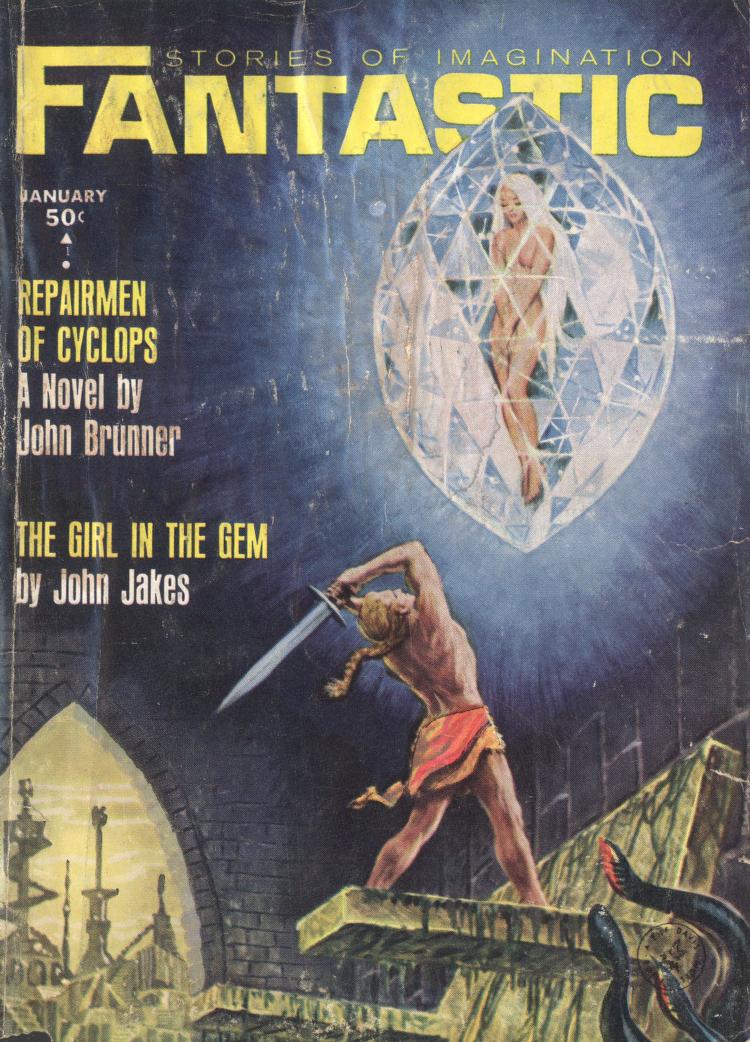
Cover art by Emsh
The Girl in the Gem, by John Jakes

Interior illustrations also by Emsh
Here's another swashbuckling adventure of the mighty barbarian Brak, whom we've met many times before.
In unheroic fashion, our protagonist is passed out drunk in a seaside inn. A bunch of dwarfs rush in, armed with knives, but deliberately avoid hurting him. It's all part of a plot to frame him for robbery. You see, an earthquake tumbled the old palace into the ocean. Another one raised it up again. Meanwhile, the local king is dying. His daughter blackmails Brak with the threat of death for thievery if he doesn't undertake the dangerous task of rescuing her sister, who was imprisoned in a gigantic jewel, from the recently revealed palace. Of course, this means he has to defeat a hideous creature.
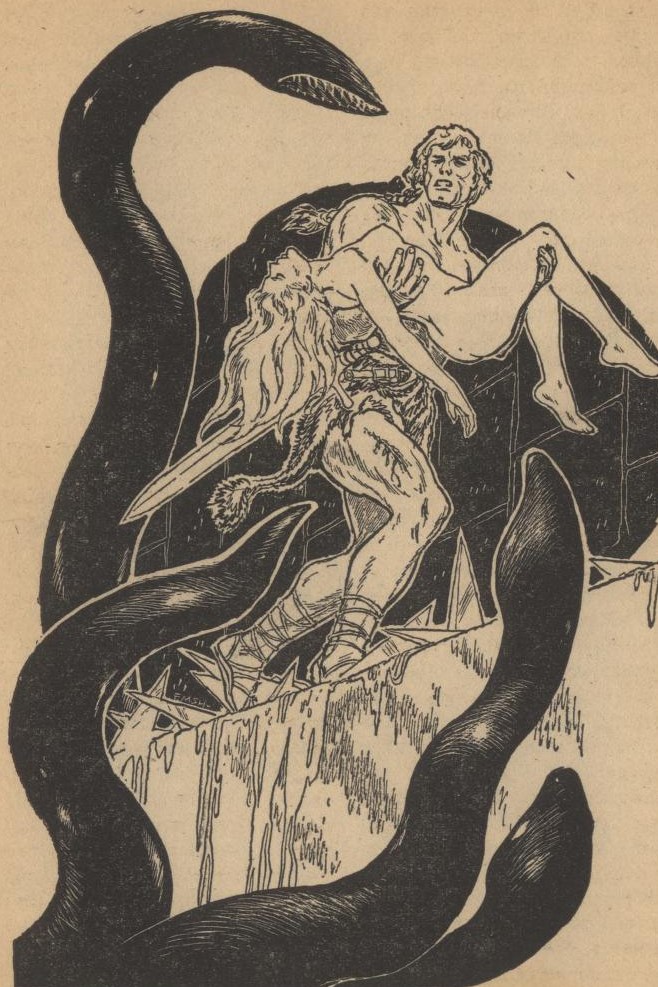
The mandatory monster
The author writes vividly and definitely keeps the action moving. This is the shortest tale of Brak yet, and it's got plenty of plot for its length. The characters are standard for the sword-and-sorcery genre, and a few incidents seem arbitrary. (Why are the royal servants who invade the inn all dwarfs?) Despite a lack of originality in some aspects, it's worth reading.
Three stars.
Journal of a Leisured Man, by Bryce Walton

Illustration by George Schelling
In a technologically advanced future, an accountant loses his job to a computer. Like many other people, he is forced to remain unemployed for the rest of his life. To add to his troubles, his faithless wife leaves him for another man.
The company that formerly employed the fellow makes automatons, in the form of animals, children, and adults. We witness some gruesome ways customers use these simulacra. In what seems to be at first an act of kindness, an employee of the company offers the man a synthetic duplicate of his wife, to do with as he pleases. You may predict the twist ending.
Although there are few surprises, the story has a certain grim power. It's not always pleasant to read, but is likely to remain in the memory.
Three stars.
On the River, by Robert F. Young
A man finds himself on a raft, floating down a river by day, staying at deserted inns on shore by night. He meets a woman in the same situation, and romance blooms. It soon becomes obvious that both of them attempted suicide, and that the river leads to death.
(The idea of an afterlife on a world dominated by a river also appears in the most recent issue of Worlds of Tomorrow. Given the delays in the publishing industry between writing a story and seeing it in print, this must be nothing more than a coincidence.)
I'm a sucker for this author's bittersweet love stories, so I enjoyed this one quite a bit. The conclusion may be obvious, but any other ending would have been inappropriate for a writer who wears his heart on his sleeve.
Four stars.
The Repairmen of Cyclops (Part One of Two), by John Brunner
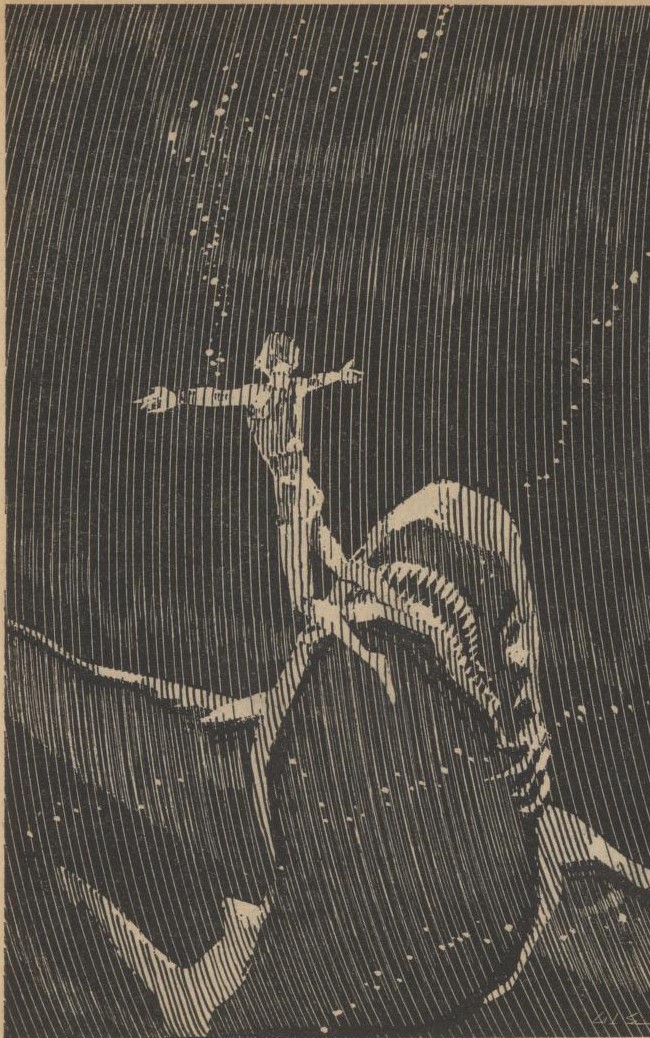
Illustrations by George Schelling
A little research reveals that this novel is set in the same universe as two previous works, each published as one-half of an Ace Double. The series as a whole deals with what are known as Zarathustra Refugee Planets. Many centuries ago, the star which the colony planet Zarathustra orbited went nova. The inhabitants, fleeing the disaster, wound up populating a large number of planets. The Galactic Corps watches over these worlds, making sure that outsiders don't interfere with their development, while refraining from becoming overly involved themselves.

Cover art by Emsh
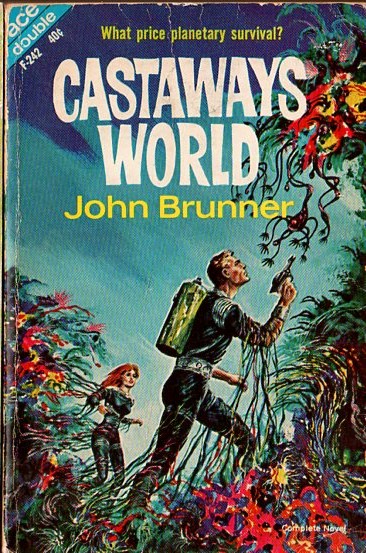
Also by Emsh
In the style of Philip K. Dick, the author uses many different viewpoint characters, so it takes a while before the main thrust of the plot becomes clear. The story mostly takes place on Cyclops, a relatively poor planet, although there is a wealthy upper class. An agent of the Galactic Corps, who was, I believe, the protagonist of Secret Agent of Terra, reviewed by our own Rosemary Benton some time ago, arrives after twenty years of service. Her reward for two decades of unpleasant, thankless work is considerable. She will have her youth restored, and her life extended for two centuries.
The extremely advanced medical technology of the Galactic Corps is one reason why the ruler of the planet resents them. (Although the government of Cyclops is, in theory, representative, she wields the real power.) There is also the fact that many natives of Cyclops were killed by the inhabitants of another world when they tried to make slaves of them. (I think these events also appeared in Secret Agent of Terra. Castaways' World does not seem to be as closely related to this new novel.)
The ruler's lover is an ex-spaceman who lost a leg in an accident. Although it was replaced, he is no longer allowed to serve on spaceships. While hunting the gigantic shark-like creatures who live in the oceans of Cyclops, he loses the same leg. After a brief stay in the local Galactic Corps hospital, he is whisked back to the care of his lover and her doctor. This creates a mystery for the Galactic Corps; how was the man's leg replaced, given the limited medical technology of Cyclops, and how do they expect to do it again? The author soon reveals the answer in scenes that take place on another world, where a sinister conspiracy takes advantage of unsuspecting victims.
Although a bit melodramatic in parts, this is an intriguing novel, full of richly defined characters, many of whom I have not even mentioned.
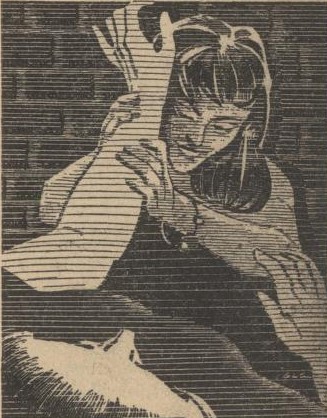
I haven't talked about these people.

I also haven't brought up these folks.
The author balances scenes of violent action with necessary exposition. It's interesting to note that the characters who are, I assume, the main protagonist and the primary antagonist are both powerful women. The complex background is fully developed, without becoming overwhelming.
Four stars.
Make Mine Trees, by David R. Bunch
The magazine's most controversial writer returns with another dark and strange story. This one is more comprehensible than most, and the title definitely helps you understand what's going on. The narrator, who is clearly as mad as a hatter, used some kind of formula to change his wife and her lover into trees. Now his young son is undergoing the same transformation. Typical for the author, the plot is much less important than the eerie mood and the eccentric style.
Three stars.
Multiple Choice, by John Douglas
A trio of young men, who have undergone a series of tests to become part of the elite, wait in a room for their final examination. They hear gunshots and screams from outside. Each one has a different theory about what's happening. Is it a hoax, designed to test their nerves? Are those who fail the last exam shot to death? Is it even possible that everyone is killed? The story's ending is inconclusive, which may be the point. Many readers will find the lack of a full resolution frustrating.
Two stars.
Something For Everyone?
Although the overall mood of the issue is on the dark side, there are all kinds of imaginative fiction to be found between its covers. From a heroic fantasy set in a distant past that never existed, to an adventure in deep space in the far future, and from a romantic parable of love and death, to a cynical portrait of tomorrow's dystopian society, there is enough variety to please just about every reader of speculative literature. You won't enjoy every story, but I don't think you'll dislike all of them. (If you do, turn to Robert Silverberg's book review column for more recommendations.)

He mostly reviews anthologies and collections in this particular column, so you've got lots to choose from.

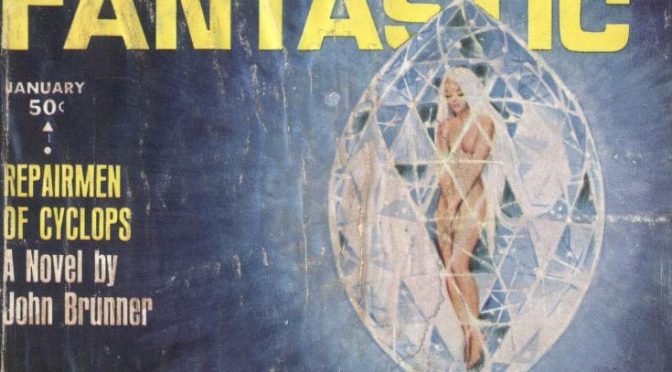
A nice early Christmas present to have a copy of Fantastic coming through.
Brak stories haven't really done much for me in the past and this continues to just be fine. Nice cover art from it by Emshwiller.
Walton's story was an interesting one. More the kind of thing I would expect to see in Science Fantasy. Made an good break-up of the magazine.
As I have said before, Bunch and Young are among my least favourite writers at the moment so was wary of having them both in this issue. The former wasn't up to much but I was pleasantly suprised by Young's river story much better written with a sense of melancholy. Didn't expect to enjoy his that much.
Brunner is a consistently inconsistent writer, not sure which side this will land on. Will have to see next issue.
Multiple Choices kind of felt like a joke story without a punchline. Weakest tale in the magazine for me.
So overall a strong issue, hope this keeps up.
However, I am getting a bit worried about these circulation figures. From having 41K readers in 1962, fell to 33K in 1963 and now to 27K for 1964. I am concerned we may lose Fantastic as we know it soon and I will end up with only Galaxy and Worlds of Tomorrow as my only regular North American magazines. Hopefully not the case.
The Young really is a good story though it ends a little abruptly. It would make a great episode for an anthology show. I am looking forward to the Brunner!